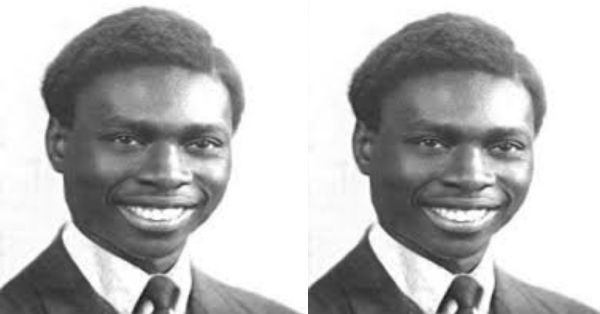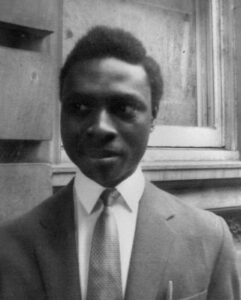Ayo Bankole: The Genius Who Redefined Nigerian Classical Music

Ayo Bankole: The Genius Who Redefined Nigerian Classical Music – Imagine a young boy, barely seven years old, sitting at a harmonium in a Lagos church, his fingers dancing across the keys with an uncanny precision that belied his age. That boy was Ayo Bankole, a prodigy who would grow up to become one of Nigeria’s most revolutionary composers—a man whose music fused Yoruba traditions with Western classical forms, creating a sound that was entirely his own.
Today, as we commemorate what would have been his 80th birthday, we celebrate not just a musician, but a visionary who transformed Nigeria’s classical music landscape. His life was tragically cut short at 41, but his legacy lives on in every note of his compositions, in the halls of the Ayo Bankole Music Center, and in the hearts of those who understand the depth of his genius.
This is the story of Ayo Bankole—organist, composer, ethnomusicologist, and one of Africa’s most underrated musical pioneers.
The Early Years: A Child Prodigy in the Making
Born in Jos, Nigeria, in 1935, Ayo Bankole was destined for music. His father, Theophilus Abiodun Bankole, was an organist and choirmaster, while his mother taught music at a prestigious girls’ school. From the moment young Ayo could reach the piano keys, his talent was undeniable.
By age five, he was already absorbing the hymns and anthems of the Anglican Church. Recognizing his potential, his father sent him to Lagos to study under his grandfather, Akinje George, the organist at First Baptist Church, Lagos. Here, Ayo’s musical foundation was cemented—learning piano, harmonium, and the intricate harmonies of Western sacred music.
But his real breakthrough came when he joined the Cathedral Church of Christ Choir, Lagos, under the legendary Thomas Ekundayo Phillips, Nigeria’s first professionally trained organist. The choir was an elite institution, filled with the sons of Nigeria’s upper class, but Ayo stood out—his voice, his technique, and his innate musicality set him apart.
London Calling: The Making of a Master Composer
In 1957, Bankole earned a Federal Government scholarship to study at the Guildhall School of Music and Drama, London. This was his gateway to the world of avant-garde composition.
At Guildhall, he immersed himself in 20th-century techniques—atonality, twelve-tone rows, and experimental harmonies. His early works, like “Three Yoruba Songs” (1959) and the “Toccata and Fugue for Organ” (1960), showcased a bold fusion of Yoruba melodies with European modernism.
But Bankole wasn’t just a composer—he was a performer. By 1964, he achieved the Fellowship of the Royal College of Organists (FRCO), the highest British organ diploma, becoming only the second Nigerian (after Fela Sowande) to earn this honor.
His time in England shaped his intercultural approach—he didn’t just mimic European styles; he reimagined them through an African lens.
The American Influence: Ethnomusicology & Innovation
After Cambridge, Bankole’s journey took him to the University of California, Los Angeles (UCLA), where he studied ethnomusicology under Roy Travis, a pioneer in African-inspired composition.
Here, Bankole’s music evolved again. He began integrating Nigerian folk rhythms, pentatonic scales, and indigenous instruments into classical forms. His “Ethnophony” was a groundbreaking work—a fusion of African and Western musical philosophies.
This was no mere imitation. Bankole was creating a new musical language, one that respected tradition while embracing innovation.
Return to Nigeria: A Legacy Cut Short
The Tragic End of Ayo Bankole: A Genius Silenced Too Soon
In the early hours of November 6, 1976, one of Nigeria’s brightest musical stars was brutally extinguished. Ayo Bankole, just 41 years old, and his wife, Toro Bankole, were murdered in their own home—allegedly by Bankole’s half-brother. The details remain shrouded in mystery, but the impact was undeniable: Nigeria had lost one of its greatest composers in the most horrific way possible.
This wasn’t just a crime against a man—it was an attack on Nigeria’s cultural heritage. Bankole was at the peak of his creative powers, composing groundbreaking works, mentoring young musicians, and shaping the future of African classical music. His death left a void that has never truly been filled.
Why Was Ayo Bankole Killed?
The exact motive remains unclear, but family disputes over inheritance and property have been speculated. Some sources suggest deep-seated personal resentments, while others point to darker, unresolved tensions. What we know for certain is that the murder was premeditated and violent, cutting short the life of a man who had so much more to give.
A Loss Beyond Measure
At the time of his death, Bankole was:
- Lecturing at the University of Lagos, shaping the next generation of musicians.
- Composing ambitious new works, including operas and cantatas blending Yoruba traditions with Western classical forms.
- Expanding Nigeria’s musical identity on the global stage.
His murder didn’t just end a life—it stole a legacy. Imagine what more he could have composed, what innovations he might have pioneered, what students he could have inspired.
The Three Toccatas: A Testament to Genius
No discussion of Bankole is complete without his Three Toccatas for Organ (1962–64)—complex, daring, and ahead of their time.
- Toccata I: A baroque-inspired work with rapid scales and a Yoruba hymn woven into its fabric.
- Toccata II: More pianistic, with Alberti bass patterns—proof of Bankole’s keyboard mastery.
- Toccata III: Fully atonal, a bold departure from tradition, ending in a triumphant B major chord.
These pieces weren’t just technical showpieces—they were cultural statements, proving that African composers could redefine classical music.
Conclusion: Why Ayo Bankole Still Matters
Ayo Bankole was more than a composer—he was a musical revolutionary. He proved that African and Western traditions could coexist, innovate, and inspire.
Today, his Ayo Bankole Music Center in Lagos keeps his legacy alive, hosting jazz nights, choral performances, and workshops. His unpublished manuscripts remain treasures waiting for wider recognition.
As we honor his 80th birthday, let’s remember: Ayo Bankole didn’t just write music—he rewrote history.
Final Thought
“Great music transcends borders. Ayo Bankole’s genius was in making the world hear Africa through the language of classical music—and making Africa hear the world in return.”
Want More?
Read: Ayra Starr: Biography, Early Life, Age, State, Impressive Career, Networth








